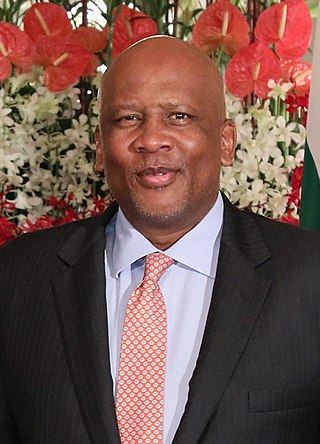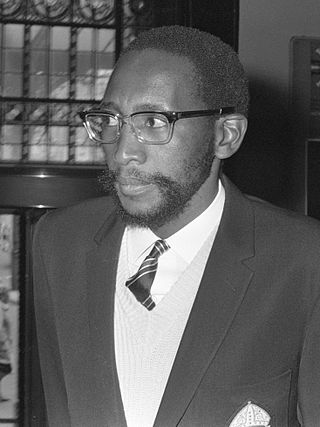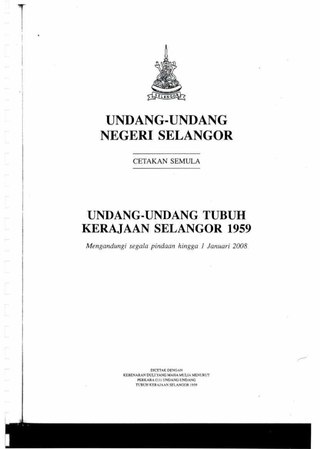A head of state is the public persona who officially embodies a state in its unity and legitimacy. Depending on the country's form of government and separation of powers, the head of state may be a ceremonial figurehead or concurrently the head of government and more.

The monarchy of Spain or Spanish monarchy, constitutionally referred to as The Crown, is a constitutional institution and the highest office of Spain. The monarchy comprises the reigning monarch, his or her family, and the royal household organization which supports and facilitates the monarch in the exercise of his duties and prerogatives. The Spanish monarchy is currently represented by King Felipe VI, Queen Letizia, and their daughters Leonor, Princess of Asturias, and Infanta Sofía.

Letsie III is King of Lesotho. He succeeded his father, Moshoeshoe II, who was forced into exile in 1990. His father was briefly restored in 1995 but died in a car crash in early 1996, and Letsie became king again. As a constitutional monarch, most of King Letsie's duties as monarch of Lesotho are ceremonial. In 2000, he declared HIV/AIDS in Lesotho to be a natural disaster, prompting immediate national and international response to the epidemic.

Moshoeshoe II, previously known as Constantine Bereng Seeiso, was the Paramount Chief of Basutoland, succeeding paramount chief Seeiso from 1960 until the country gained full independence from Britain in 1966. He was King of Lesotho from 1966 until his exile in 1990, and from 1995 until his death in 1996.

The governor-general of Antigua and Barbuda is the representative of the monarch of Antigua and Barbuda, currently King Charles III. The official residence of the governor-general is Government House.

There are sixteen people in the line of succession to the Belgian throne.

Succession to the British throne is determined by descent, gender, legitimacy and religion. Under common law, the Crown is inherited by a sovereign's children or by a childless sovereign's nearest collateral line. The Bill of Rights 1689 and the Act of Settlement 1701 restrict succession to the throne to the legitimate Protestant descendants of Sophia of Hanover who are in "communion with the Church of England". Spouses of Catholics were disqualified from 1689 until the law was amended in 2015. Protestant descendants of those excluded for being Roman Catholics are eligible.
The Regency Acts are Acts of the Parliament of the United Kingdom passed at various times, to provide a regent in the event of the reigning monarch being incapacitated or a minor. Prior to 1937, Regency Acts were passed only when necessary to deal with a specific situation. In 1937, the Regency Act 1937 made general provision for a regent, and established the office of Counsellor of State, a number of whom would act on the monarch's behalf when the monarch was temporarily absent from the realm or experiencing an illness that did not amount to legal incapacity. This Act, as modified by the Regency Acts of 1943 and 1953, forms the main law relating to regency in the United Kingdom today.

The Senate of Lesotho is the upper chamber of the Parliament of Lesotho, which, along with the National Assembly of Lesotho, comprises the legislature of Lesotho.
The Palace Law of Succession, Buddhist Era 2467 (1924) governs succession to the Throne of the Kingdom of Thailand, under the ruling House of Chakri. Succession matters prior to the end of absolute monarchy in 1932 could be contentious, especially during the Ayutthaya period from the 14th to 18th centuries. In 1924, King Vajiravudh attempted to clarify the succession process by laying down the Palace Law of Succession. It was promulgated and came into effect in November 1924 as, in part, an attempt to eliminate the vagueness relating to succession within the Thai monarchical regime and to systematically resolve previous controversies. In 1932, after Siam became a constitutional monarchy, various amendments relating to succession were introduced. The 1997 Constitution of Thailand relied on the law with regards to succession, but the 2006 Interim Constitution made no mention of succession, leaving it to "constitutional practice". The 2007 Constitution again relied on the Palace Law. The preamble of the 2014 interim constitution of Thailand abrogated the 2007 Constitution, with the exception of chapter 2, concerning the monarchy and the succession.
An order of succession or right of succession is the line of individuals necessitated to hold a high office when it becomes vacated such as head of state or an honour such as a title of nobility. This sequence may be regulated through descent or by statute.
The Sri Lankan presidential line of succession is the order in which persons may become or act as the President of Sri Lanka upon the incapacity, resignation or death of an incumbent President.

'Masenate Mohato Seeiso is Queen consort of Lesotho as the wife of King Letsie III of Lesotho. She was the first commoner in modern history to marry into the royal family of Lesotho. Since becoming queen, she has become the patron of several charities and has worked to promote the work of projects related to HIV/AIDS.

Princess Senate Mohato Seeiso is a princess of Lesotho, the eldest child of King Letsie III of Lesotho and his wife Queen 'Masenate Mohato Seeiso.
Vice President of the Maldives is the holder of a public office created by the Constitution of the Maldives. The current office-holder is Faisal Naseem, since 17 November 2018.

The Succession to the Crown Act 2013 is an Act of the Parliament of the United Kingdom that altered the laws of succession to the British throne in accordance with the 2011 Perth Agreement. The Act replaced male-preference primogeniture with absolute primogeniture for those in the line of succession born after 28 October 2011, which means the eldest child, regardless of gender, precedes any siblings. The Act also repealed the Royal Marriages Act 1772, ended disqualification of a person who married a Roman Catholic from succession, and removed the requirement for those outside the first six persons in line to the throne to seek the Sovereign's approval to marry. It came into force on 26 March 2015, at the same time as the other Commonwealth realms implemented the Perth Agreement in their own laws.

In Thailand, the regent is a person who exercises the official functions of a monarch of Thailand when the monarch is incapable of functioning or during a period of interregnum.

The Laws of the Constitution of Selangor 1959 is the fundamental law of the state of Selangor and establishes the state as a constitutional monarchy with the Sultan of Selangor as the Head of State. It came into force in April 1959 following the independence of Federation of Malaya in 1957.
 Moshoeshoe II (1938–1996)
Moshoeshoe II (1938–1996) King Letsie III (born 1963)
King Letsie III (born 1963) 









